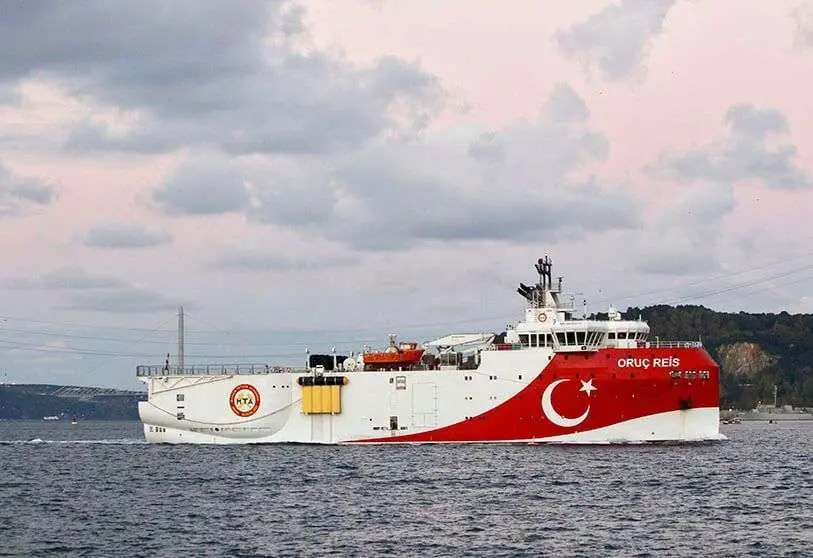Greece and Turkey agree to resume talks on the Eastern Mediterranean

The tone softened last week, giving some hope for a diplomatic solution to the conflict. Turkey and Greece have agreed to discuss the disputed waters of the eastern Mediterranean. The start of an armed conflict in the Mediterranean was not on the agenda in Ankara and Athens, but events in recent months have increased tensions between the two countries and led to an escalation of violence.
But on Tuesday both sides said they were "ready to start exploratory talks" following a three-way video conference between Turkish President Recep Tayyip Erdogan, German Chancellor Angela Merkel and the head of the European Council Charles Michel. In a press release issued by the Turkish Chancellery, "Turkey-EU relations were discussed in detail" and the process to start "exploratory talks" was launched. "President Erdogan stated that the measures to be taken by Greece will be important in terms of reactivating the exploratory talks and other channels of dialogue and the implementation of the agreement reached", continued the Turkish Executive's text.

For its part, the Greek Foreign Ministry also confirmed the talks, announcing that they would soon be held in Istanbul, without setting a date. "Greece and Turkey have agreed to hold the 61st round of exploratory talks in Istanbul in the near future," the Greek Ministry said in a statement.
Over the past 14 years, 60 rounds of talks between the two North Atlantic Alliance (NATO) member states have failed to make progress and have been frozen in 2016.
"The resumption of exploratory contacts between Greece and Turkey are talks rather than negotiations. Holding talks means that we are trying to find rules on which we are going to negotiate", said the Greek Foreign Minister, Nikos Dendias, in Athens. These statements by the Greek Minister of Foreign Affairs show how far apart the two parties to the conflict are, as there is still a long way to go to establish negotiations to resolve the dispute over the exclusive economic zone.
Turkish officials have insisted that the Oruç Reis should return to work, and the ship-tracking website marinetraffic.com showed that the ship was on the move Tuesday afternoon, although it is not known exactly where it was heading. The last time Ankara and Athens sat down to discuss these disputes over the continental shelf was in 2016.
In August and September, Greece and Turkey were confronted in an increasingly violent manner over the right to drill for energy resources in an area of the eastern Mediterranean. The most worrying point for NATO and the EU came in early August, when the Turkish drill ship Oruç Reis was sent to conduct seismic research in what the Mitsotakis government understood to be a violation of its EEZ.

This led to Greek naval flotillas being sent to the region and the two countries' ships being lined up in Mediterranean waters, while the two countries exchanged verbal attacks at every public appearance by their leaders.
France showed its support for Greece and its president, Emmanuel Macron, announced the sending of military forces to support Athens. The EU High Representative for Foreign Affairs and Security Policy, Josep Borrell, also expressed his "total solidarity with Greece".
Last week, after intense diplomatic activity, particularly on the part of Germany, the Oruç Reis returned to the port of Antalya, paving the way for talks. Erdogan said Turkey had withdrawn the ship to begin diplomatic talks with Athens, but warned that the decision did not mean that Turkish operations were over. The Oruç Reis has left the Turkish port, although, according to Turkish newspaper Yeni Safak, it remains in the Gulf of Antalya.
Greece, Cyprus and France have demanded that the EU impose severe sanctions on Ankara. Erdogan and Macron exchanged harsh criticism for several weeks. Turkey accused the French leader of arrogance. In a telephone conversation with the Turkish leader on Tuesday, Macron called on Turkey to "fully respect the sovereignty of EU member states and international law, to refrain from any further unilateral action that could lead to tensions, and to commit itself unequivocally to the construction of a zone of peace and cooperation in the Mediterranean," reported the French daily Le Figaro.
In his speech to the UN General Assembly, Erdogan called, by videoconference, for "a sincere dialogue" to resolve the conflict and rejected "any imposition, harassment or attack in the opposite direction".
A European Council was scheduled to take place this week with the foreign ministers to discuss the dispute in the eastern Mediterranean and possible sanctions against Turkey. This is an issue that has created controversy and blocked other matters such as sanctions against Belarus. Cyprus' unease at Brussels' lack of activity against Ankara led the island to block the implementation of the sanctions against Lukashenko, whom the EU does not recognise.
Despite these new diplomatic movements which are serving to calm the waters in the Mediterranean, Turkey issued a navigational telex on Tuesday, which serves as a warning to other vessels to stay away from a perimeter, for the waters around the Greek island of Lemnos.









